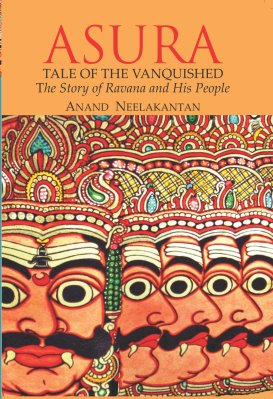
The Rise of Sivagami: Book 1 of Baahubali – Before the Beginning by Anand Neelakantan
‘Why did Kattappa kill Baahubai?’, the most asked question in these 2 years, only begins 
to gauge the wide public interest in the Baahubali franchise. While the answer to this question might evade us till the end April this year, when Baahubali 2 -The Conclusion releases, clues to it might be hidden in plain sight within the pages of The Rise of Sivagami, written by Anand Neelakantan. SS Rajamouli and Anand Neelakantan were well ahead of their game in marketing Baahubali franchise and the book by releasing Chapter 2: Kattappa ahead of the book release to pique interest. The book was up for pre-ordering on Amazon and it hit the stands on 15th of March, 2107. I caught hold of a digital copy from the Kindle store on the D-day.
The very first few pages into the book told me that it will need more than my  cursory attention. All the main characters are listed with their brief description before the story begins. This gives you an insight into what is in store for you. It also gives you a sense of the magnitude of the plot. This fictional political drama focuses on Sivagami’s story. How from young orphan she turned into the powerful bureaucrat she seems in the first movie of the franchise. The characters seem well thought out and by the end of the book you see a lot of them evolve into full bloom. The plot twists and turns tend to shock at times and sometimes get predictable. But, this book only starts to lay a ground for the plot twists and turns that could be possible in a story of this magnitude.
cursory attention. All the main characters are listed with their brief description before the story begins. This gives you an insight into what is in store for you. It also gives you a sense of the magnitude of the plot. This fictional political drama focuses on Sivagami’s story. How from young orphan she turned into the powerful bureaucrat she seems in the first movie of the franchise. The characters seem well thought out and by the end of the book you see a lot of them evolve into full bloom. The plot twists and turns tend to shock at times and sometimes get predictable. But, this book only starts to lay a ground for the plot twists and turns that could be possible in a story of this magnitude.
Anand Neelakantan had announced his arrival with his book Asura: The Tale of the Vanquished. And, in true Anand Neelakantan style, there are no black and white characters here either; every character has a gray shade, with the exception of Kattappa and Mahadeva. But, Neelakantan, a fan of the A Song of Ice and Fire series himself, assures us that the plot will only thicken as the series proceeds.
Verdict: If you have enjoyed Baahubali, the movie and the mini-series on Amazon Prime, then you are definitely going to love and enjoy it. This book serves in thickening the plot and getting you further immersed into the world of Mahishmati.



 quite some time and I decided to finally get my hands on it when I came across it in
quite some time and I decided to finally get my hands on it when I came across it in


